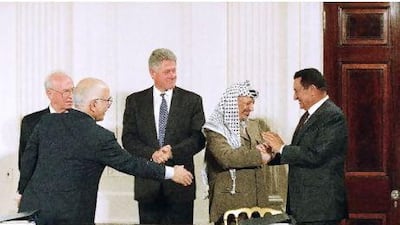TEL AVIV // Israeli officials yesterday appeared anything but jubilant over the resignation of the Egyptian president, Hosni Mubarak.
For Israel, Mr Mubarak has symbolised the stable relationship that the country has maintained with Egypt, with which it had fought four bitter wars, since clinching a historic peace agreement in 1979 - Israel's first with an Arab state.
Israel has reacted cautiously to the news, with Benjamin Netanyahu, the Israeli prime minister, ordering his cabinet ministers to refrain from publicly commenting on Mr Mubarak's fall from power.
Former top Israeli officials were more open about Israel's concerns.
Zvi Mazel, the former Israeli ambassador to Egypt, predicted a downgrade in Egypt's regional status and a new hostility that would have to be faced by Israel.
"It's over - Egypt is no longer a regional superpower. Egypt has completely lost its standing in the Middle East, while Turkey and Iran are gaining power," he said. "Strategically, Israel remains in a hostile situation. There is no one to lead the pragmatic and moderate countries in the region."
Benjamin Ben-Eliezer, a former Israeli defence minister who has been in close touch with Mr Mubarak for years, told Israeli media that he had a 20-minute conversation with Mr Mubarak on Friday, in which the Egyptian leader warned that his country's regime might be taken over by Islamists.
Mr Ben-Eliezer, a member of the centrist Labor party who has served in various Israeli coalition governments, said in reference to Mr Mubarak: "He gave me a lesson in democracy and said: 'We see the democracy the United States spearheaded in Iran and with Hamas, in Gaza, and that's the fate of the Middle East. They may be talking about democracy but they don't know what they are talking about and the result will be extremism and radical Islam."
Israeli officials fear their country may no longer have Egypt as its best friend in the Middle East. Indeed, in the past few years, the alliance with Egypt has tightened as relations with Jordan, the only other Arab country at peace with Israel, have cooled amid Jordanian criticism of Israel's approach towards Palestinians. Turkey, a former close ally of Israel, has also distanced itself from the country after Israel's three-week onslaught in the Gaza Strip more than two years ago.
The governments of both countries have developed a close relationship since the peace pact was clinched, especially in co-ordinating security issues. Last week, secret memos leaked to the whistleblower website WikiLeaks from the US embassies in Tel Aviv and Cairo showed that the two countries had co-ordinated their decisions on the Israeli-Palestinian peace process, arms smuggling into Hamas-ruled Gaza and Iran's nuclear ambitions. Israel also relies on Egyptian natural gas supply to fulfil about 40 per cent of its electricity needs.
Israeli officials are also worried that the upcoming changes in Egypt could mirror those that took place in 1979 in Iran, where the revolution that year replaced a pro-American shah with a theocratic Islamic republic that Israel now considers its arch enemy.
Indeed, Israeli officials appear to have little sympathy for the democratic aspirations of citizens in Arab states. As Gabi Ashkenazi, the outgoing Israeli army chief, was quoted by Israeli media as saying last week: "In the Middle East, stability is preferable to democracy."
In a possible bid to allay Israeli fears, Admiral Mike Mullen, the senior military adviser of the US president, Barack Obama, is scheduled to arrive in Tel Aviv today to hold talks with Israeli officials, including Mr Netanyahu and President Shimon Peres, on the co-ordination of a new approach towards Egypt. Admiral Mullen, the chairman of the joint chiefs of staff, is also scheduled to stop in Amman for meetings with Jordanian officials today, including King Abdullah II.
Palestinian officials in the West Bank, in possible anticipation of calls for democratic reform among Palestinians after the Egyptian protests, yesterday announced that presidential and legislative elections would be held by September. The vote had been put off since last year amid a split between the Palestinian Authority in the West Bank, dominated by the secular Fatah movement, and the government in the Gaza Strip, run by the Islamist group Hamas. However, Hamas said yesterday that it would not participate.
In Gaza, jubilation erupted with the resignation of Mr Mubarak, with thousands of people filling the streets, shooting in the air and beeping car horns, Agence France-Presse reported.
The celebration suggested that Hamas expected the new Egyptian regime to become more lenient towards the enclave's Islamist rulers. The Hamas spokesman, Sami Abu Zuhri, called on Egypt's new leaders to immediately open the Rafah terminal between Gaza and Egypt, which has been closed since January.

